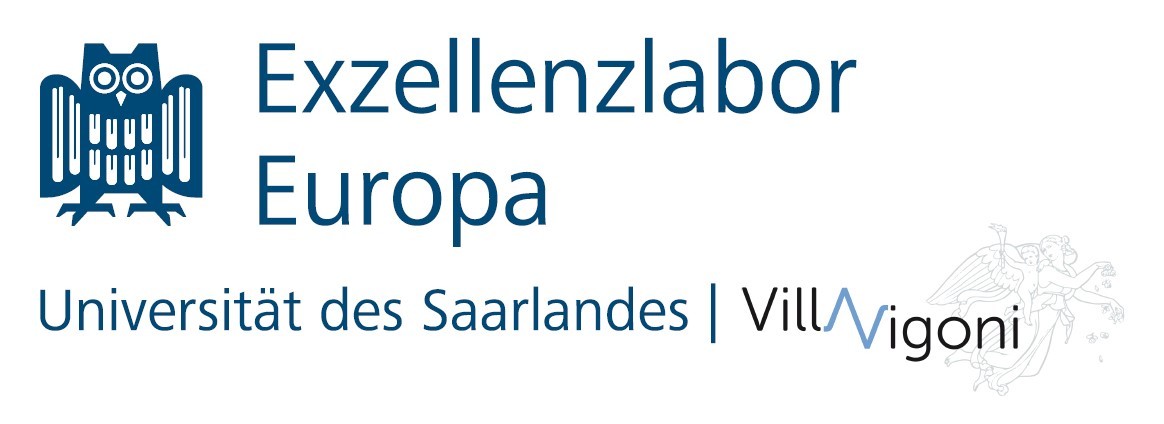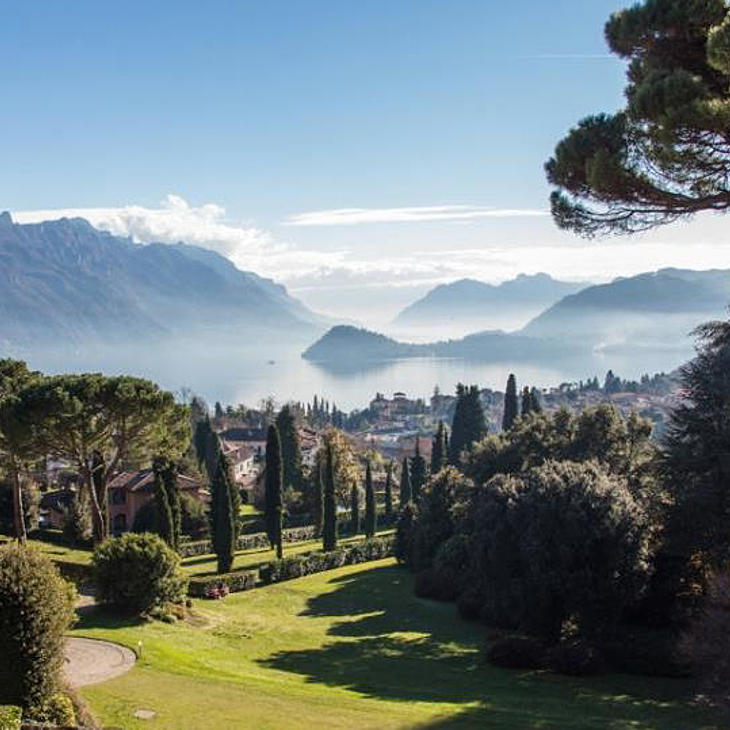Exzellenzlabor Europa
The Exzellenzlabor Europa (European Laboratory of Excellence) was founded in 2021 by Saarland University and Villa Vigoni e. V. – German-Italian Centre for European Dialogue and is coordinated by Saarland University's Cluster for European Research (CEUS). As part of this long-term cooperation partnership, an international academic event is held annually over the course of several days at Villa Vigoni in Italy. The objective of the Exzellenzlabor Europa is to promote an interdisciplinary dialogue at European level on issues that are relevant to Europe, focusing in particular on Europe's relations with the world and the question of how 'concepts' of Europe are projected, transformed and reflected upon. Providing support for early career researchers is a further key aim of the cooperation. The results of the Exzellenzlabor Europa are published in the form of edited volumes and conference proceedings, including in the CEUS publication series Saarbrücker Beiträge zur Europaforschung (Nomos).
Saarland University has a long-standing tradition in the field of European research and European studies. Founded in 1948 as a French-Saarland initiative, the university has always had a pronounced focus on Europe in the humanities, cultural studies, social sciences, law and economics. The university's European profile is reflected in the research activities of its scholars, numerous Europe-related (research) institutions and degree programmes, funding programmes for early career researchers, and international networks.
Exzellenzlabor Europa 2025
European inequalities across borders: dividing and integrating processes
Das 5. Exzellenzlabor Europa findet vom 8. bis 11. Oktober 2025 in der Villa Vigoni statt und widmet sich dem Thema der Ungleichheiten in grenzüberschreitenden Regionen in Europa. Diese Ungleichheiten, die durch die jüngsten politischen, ökologischen und wirtschaftlichen Krisen verstärkt wurden, stellen die langfristigen Ziele der Europäischen Union in Bezug auf die wirtschaftliche, soziale und territoriale Kohäsion in Frage. Ziel des multidisziplinären Workshops ist es, innereuropäische Grenzregionen und ihre verschiedenen Dimensionen grenzüberschreitender Ungleichheiten zu untersuchen, um so die Interdependenzen zwischen koexistierenden Ungleichheiten als Effekte oder Bedingungen von Integrationsprozessen über (nationale) Grenzen in Europa hinweg zu entschlüsseln.
Die Veranstaltung wird gemeinsam von Dr. Ulla Connor (Postdoktorandin im Nachwuchskolleg Europa) und Jun.-Prof. Dr. Carola Fricke (Humangeographie mit europäischem Schwerpunkt) organisiert.
9. Oktober 2025
Border permeability and inequalities across European border areas: a retrospective study (1950–2020)
Andrzej Jakubowski, Piotr Rosik &Tomasz Komornicki
Minorities in border regions representing inequality, or promoting a process to equality? Some lessons from B-SHAPES
Martin Klatt
Social inequalities in Europe‘s border regions – the example of the coal and steel crisis in the Saar-Lor-Lux region
Birgit Metzger
Inequalities and cross-border care ecologies: the case of early childhood education and care in the greater region SaarLorLux
Sabine Bollig
Towards the generalization of sociospatial inequalities in the Greater Region?
Alexis Gumy, Antoine Decoville &Frédéric Durand
Mobility injustice and agency: how crises unveil border asymmetries
Elifcan Karacan
Transit-oriented development (TOD) in asymmetrical cross-border contexts
Flore Guichot
Turbulence, resilience, and everydayness in borderlands: tackling cross-border imbalances in three Italian borderlands
Alice Buoli, Raffaella Coletti & Ingrid Kofler
Exploring the polycrisis – borderscape nexus in Adriatic micro-islands
Isabella Traeger
The ongoing re-bordering process and growing inequalities in the peripheral borderlands. Insights from the Polish borderlands with Belarus
Dominika Studzińska
10. Oktober 2025
Asymmetry as a framework for understanding cross-border inequalities: conceptualization and empirical insights from the German-Polish borderland
Jarosław Jańczak
Bridging gaps of different sizes and kinds: Is political asymmetry mitigated by institutional integration?
Tobias Heyduk
Managing legal and institutional inequalities in the France-Spain border: the case of the Basque cross border area
Iban Larrandaburu
The paradox of integrating and dividing processes: A comparative dynamic mapping for cross-border inequalities through the INTERREG projects in the EU
Ahmed Osama Abdelhamid Bakry
Old narratives, new realities: The emerging mismatch of border inequalities and their policy discourses in Central and Eastern Europe
Ferenc Gyuris & Andrzej Jakubowski
Thinking Europe differently: challenging European inequalities through literary representations from Euro-Caribbean countries
Tobias Schank
Vergangene Exzellenzlabore
Das 4. Exzellenzlabor Europa fand vom 26. bis 28. September 2024 als internationaler mediävistischer Workshop zum Thema „Europäische Exempla edieren: Valerius Maximus im 14. Jahrhundert" statt.
Das 3. Exzellenzlabor Europa fand vom 16. bis 19. Oktober 2023 als internationale rechtswissenschaftliche Tagung zum Thema „Die Europäische Staatsanwaltschaft als Motor für Wandlungsprozesse im europäischen ‚Raum der Freiheit, der Sicherheit und des Rechts‘“ statt.
Das 2. Exzellenzlabor Europa fand vom 1. bis 4. September 2022 als internationale germanistische Tagung zum Thema „Theater und pluralistische Gesellschaften: Potenziale der ‚Kopräsenz‘“ statt.
Das 1. Exzellenzlabor Europa fand vom 9. bis 13. September 2021 als internationale Sommerakademie für Nachwuchswissenschaftler*innen in den Geistes- und Sozialwissenschaften zum Thema „Restitution, Reparationen, Reparation – Wege zu einer neuen Weltgesellschaft?“ statt.
Contact
Dr. Kristina Höfer
Campus C5 3, Room 2.23
Tel. +49 681 302-70440
kristina.hoefer(at)uni-saarland.de















